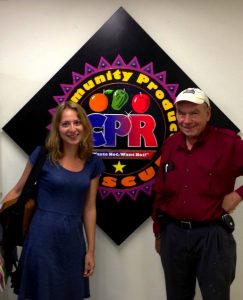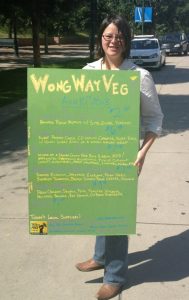
Train tracks and food waste reduction may seem like an unusual pair, but to Daniella Uslan, the two make perfect sense together. In August, Uslan boarded the Millennial Train and set out to explore food waste across the United States.
Uslan and 23 other young social entrepreneurs boarded the Millennial Train in San Francisco and spent the next ten days collaborating with social and business leaders across the United States.
The program, an incubator for change and leadership, selects a group of young people from different professions and interest areas every year to board the train and tackle issues in their field. Each participant must crowdsource $5,000 to participate in the program.
Uslan’s topic was the problem of food waste in the United States. She joined the UNC Center for Health Promotion and Disease Prevention in 2012 as a public health fellow with a special interest in sustainable agriculture. She took time off from her position to ride the Millennial Train, but saw connections with the experience and her work at HPDP.
“I’m looking at the food waste chain and how we can intervene earlier,” Uslan said. “We can do something with food before it’s inedible. There is so much food that’s unnecessarily wasted.”
But Uslan said she wants to do more than just reduce the amount of wasted food, she wants to create a product with value.
“I’m also looking food access,” she said. “I’m approaching food waste, nutrition, and food access. How can we mitigate waste, or prevent it, create a nutritious product, and link it to people who need it. I want to take the food that’s being thrown out unnecessarily, and make something with added value.”

On the trip Uslan met with farmers and food policy experts to collaborate and exchange ideas for her project.
While she was in Denver, Colo., Uslan met with MM Local, an organization that partners with local farmers to provide nutritious canned goods year round.
“There are so many cool food-related things happening across the country,” she said. “I was so inspired by what other people were doing and the people I met. It was an incredible experience.”
While Uslan was the only person on the train working in food policy, she said she gained an enormous amount of knowledge from her fellow passengers.
“There were people there from all over the country,” she said. “Everyone was so passionate about their topic and so knowledgeable. The whole idea of the project is to collaborate and develop confidence to take your idealism and channel it into a product that can make change.”
Now that she’s back from the trip, Uslan said she wants to keep the momentum she gained from the Millennial Train going. Currently, she’s working on a project to approach food waste locally.
“I’ve realized the best way to tackle this problem is local first,” Uslan said. “I want people to have local fresh produce, and I want to utilize farm excess to prevent waste and link to communities.”
Uslan is working to create a local produce system that suits the needs of community members while also adding value to their food product and reducing waste.
“When it comes to food waste prevention, if you wait until the food has gone bad, it’s already too late.”
